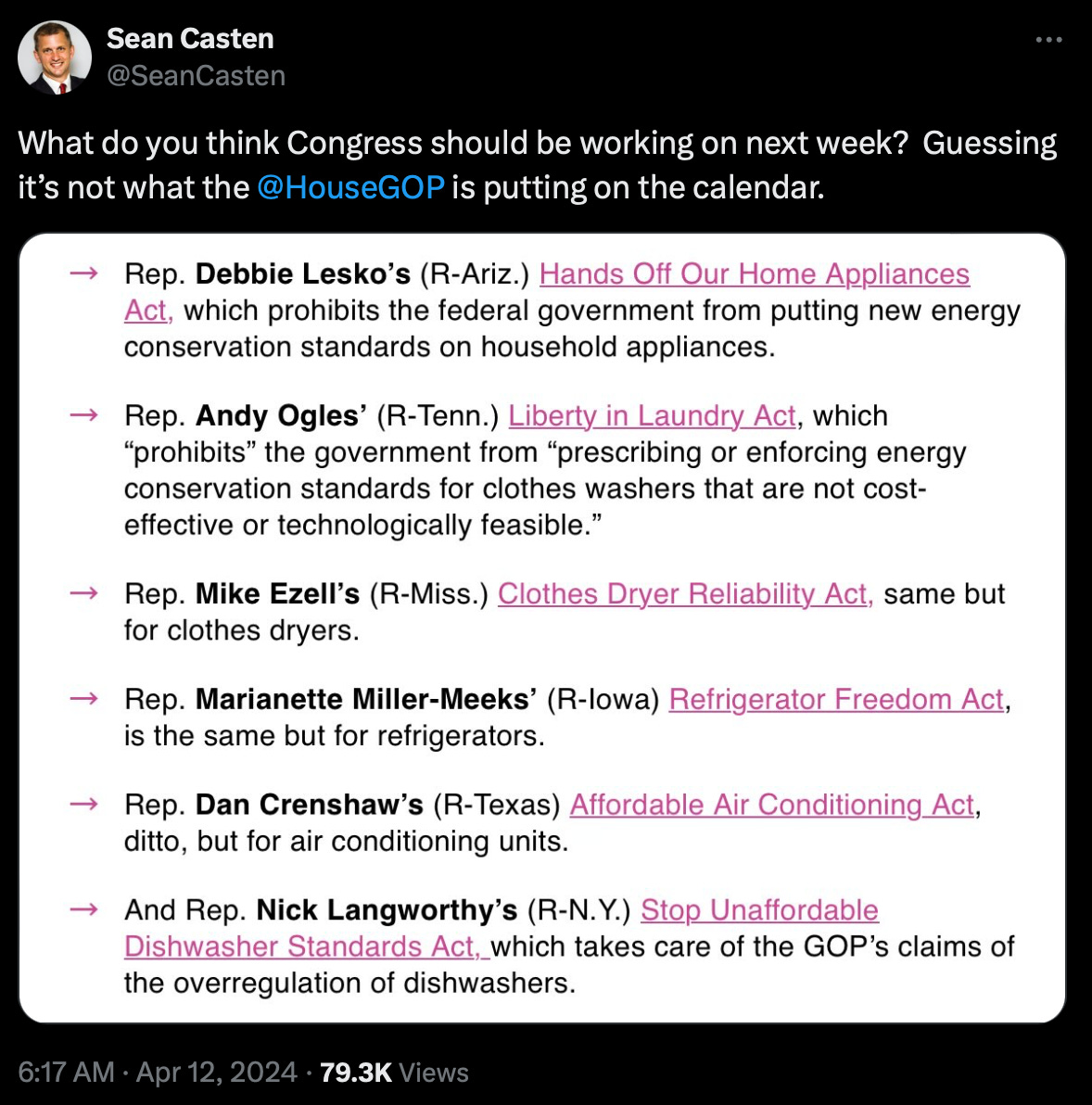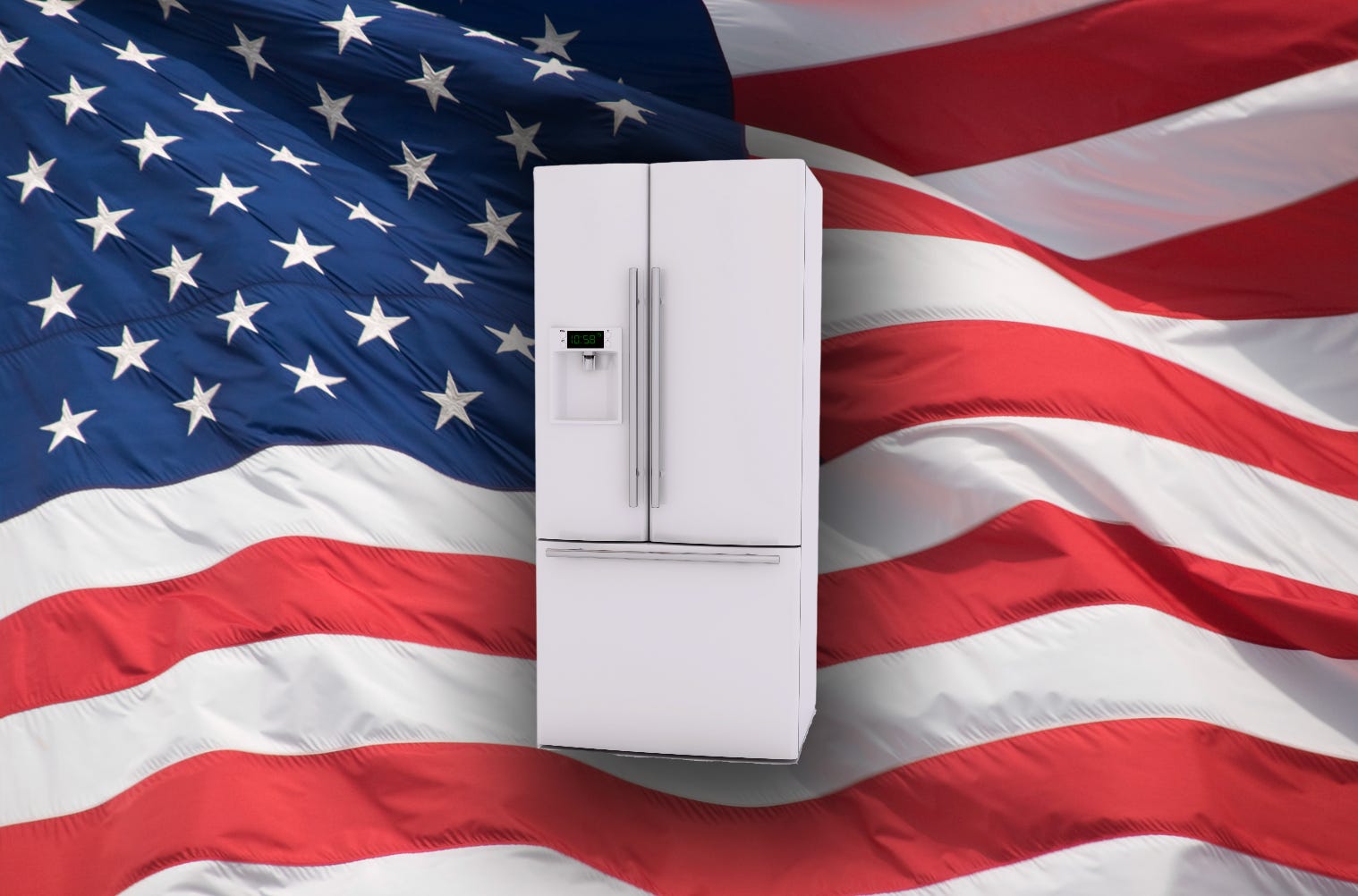Why are Republicans so obsessed with refrigerators?
The seemingly weird plan in Project 2025 is merely a new page of a familiar fossil fuel playbook.
This story is part of HEATED’s series on Project 2025. To learn more, check out our series announcement.
Over the last year, Republicans have begun championing a new and novel environmental cause. It’s not the air; it’s not the water; it’s not the climate crisis.
It’s refrigerators.
Apparently they’re getting way too efficient.

That’s the idea behind the Refrigerator Freedom Act (seriously), introduced by Rep. Mariannette Miller-Meeks (R-Iowa) this summer. The bill seeks to repeal appliance efficiency regulations proposed by the Biden Administration last year—regulations that require refrigerator manufacturers to use less electricity and water over time as technology improves.
The Department of Energy claims these regulations, along with efficiency regulations on other appliances, would save Americans about $3.5 billion a year on energy and water bills while significantly reducing climate pollution. But proponents of The Refrigerator Freedom Act say they force Americans to give up the appliances they love. “Americans can hardly afford to stock their refrigerators with food, and now Democrats want to take the damn refrigerator away as well,” Rep. Van Drew (R-NJ) argued on the House floor in July.
The characterization is inaccurate. Americans can own whatever type of appliance they want to. The regulations do make it difficult for consumers to buy new refrigerators that use tons of water and electricity. But they don’t prevent Americans from owning inefficient refrigerators.
Still, the scarcity messaging has been effective for Republicans. The Refrigerator Freedom Act passed the GOP-controlled House this summer, along with a bevy of similarly-worded bills like the Stop Unaffordable Dishwasher Standards Act (SUDS), the Liberty in Laundry Act, and the Hands Off Our Home Appliances Act (HOOHA).

These bills currently have no chance of passing the Democratic-controlled Senate. But they have a better chance of being reality if Donald Trump is elected president, as a plan to repeal appliance efficiency standards is enshrined in Project 2025, the 900-page roadmap for Trump’s second term.
Published by the conservative Heritage Foundation and co-authored by 140 former Trump appointees, Project 2025 proposes to repeal the law mandating electricity-saving and water-saving regulations for appliances—a law signed by former President Ronald Reagan and currently supported by manufacturers.
Advocates, researchers, Democrats, and even some Republicans call the plan harmful for consumers and the planet—as well as just plain weird. “Out-of-touch House Republicans have been weirdly obsessed with appliances this Congress while ignoring the real issues American families are struggling with,” Rep. Katie Porter (D-Calif.) told HEATED in an email.
But a closer look at the GOP plan to deregulate home appliances reveals that it’s not really that weird at all. It’s merely the next chapter of a familiar climate delay playbook.
“Democrats are coming for your kitchen appliances”
To truly understand the conservative effort to unravel appliance efficiency standards, you can’t just view it as a simple policy proposal. You also have to look at it as a messaging device to spread fear about efforts to slow the climate crisis.
"Democrats are coming for your kitchen appliances," tweeted Sen. Tom Cotton (R-Ark) in January 2023. “We thought we were free in America until we met you folks,” said Rep. Scott Perry (R-Pa) in a House hearing about energy efficiency standards in October 2023. “Dealing with big government is stressful enough, and a good cure for those woes is a long hot shower,” said Rep. Andy Ogles (R-Tenn). “But, like most good things, Joe Biden wants to take that away from you too.”
This messaging leans into the same language as conspiracy theories: evoking imagery of Democrats coming into people’s homes and snatching up their personal belongings. It’s far from the truth—again, efficiency standards have been in place for decades—but it serves an important purpose: allowing Republicans to turn the public’s focus away from real, present policy issues like public health, utility savings, and the climate crisis, and turn it toward fake, fully-imagined future ones.
“I see it as an attempt to extend the culture wars by focusing on things that people have in their homes that they can touch [and] they can relate to,” said Andrew deLaski, director of the Appliance Standards Awareness Project (ASAP), an advocacy group. “What sometimes gets missed is that there are some very focused special interests that want to do away with efficiency standards.”
One of the interests he’s referring to is the fossil fuel industry, which successfully deployed similar rhetoric tactics when lawmakers attempted to regulate the emissions of gas stoves. Gas lobbying groups like the American Gas Association and American Public Gas Association spent millions to fan the flames of that debate. Many of the Republican lawmakers making the most noise were those who took the most funding from the oil and gas industry. Those efforts paid off: with support from a handful of energy-loving Democrats, the Senate voted to repeal efficiency standards for gas furnaces in May. The partisan blowback also helped weaken a new DOE efficiency standard for gas stoves earlier this year.
True to form, many of the lawmakers behind the appliance efficiency pushback are major recipients of fossil fuel funding. Miller-Meeks, for example, received more than $410,000 from the fossil fuel, electric utility, and mining industries since 2007. And the sponsor of the Hands Off Our Home Appliances Act, Rep. Debbie Lesko (R-Ariz.), has received more than $370,000 since 2017.
Putting 19 million cars back on the road
But perhaps the most egregious aspect of the Republican effort to repeal appliance efficiency standards is that it comes at the expense of both consumers and the planet.
According to a recent analysis from ASAP, energy efficient appliances save Americans at least $500 a year on utility bills. Over time, those savings add up: the DOE estimates that the Biden administration’s updated standards alone will save consumers nearly $1 trillion over 30 years through lower utility bills. They also will collectively reduce businesses’ utility bills by an average $2 billion per year, according to ASAP. And rather than reducing consumer choice, experts argue that the standards protect people from poorer-quality products.
“I suppose one could argue that if you really want a lower-performing, energy-wasting appliance, the standard would prevent you from buying that,” Johanna Neumann, a senior director of the renewable energy campaign at Environment America. “It's particularly salient for renters, because renters often aren't making decisions about what appliances are in their kitchen or in their basements.”
Efficiency regulations are also an important tool in the fight against the climate crisis. The power sector is the largest source of carbon emissions in the world, but energy efficient appliances lower U.S. electricity consumption by 15 percent annually. By 2035, ASAP projects that energy efficient standards could cumulatively reduce annual emissions by an average 81 million metric tons, about the equivalent of 19 million gas-powered cars.
Trump himself has argued in favor of dismantling appliance regulations because he claims they make products worse. “You turn on the shower, if you’re like me, you can’t wash your beautiful hair properly,” he told workers at an Ohio Whirlpool manufacturing plant in 2020, disparaging Bush-era water-saving regulations on showers, sinks, and toilets. He also famously disparaged energy-saving light bulb regulations. “They took away our lightbulb. I want an incandescent light. I want to look better, okay?” he said in 2019.
However, in most cases, energy efficiency standards actually make products better, though that’s not uniformly the case. Some newer, more-efficient appliances have shorter lifespans—a problem which must be addressed. But overall, peer-reviewed research published in the Journal of Environmental Economics and Management found that most energy-saving appliances not only worked better than their less efficient counterparts, but they were also cheaper. For example, LED light bulbs use 90 percent less electricity and last 25 times longer than incandescent light bulbs. And as for Trump’s complaint, there are numerous LED options that give the same soft light effect as the now-banned incandescent bulb.
The GOP effort to dismantle efficiency regulations might make more sense if the appliance manufacturing industry stood behind it. But it doesn’t. The Association of Home Appliance Manufacturers, the manufacturing industry’s oldest trade organization, has said it supports the Department of Energy’s efficiency regulations.
Indeed, all presidents since Reagan—Democrat and Republican, except for Trump—have expanded appliance efficiency standards. The reason is clear, said Neumann: “You don't have to be a Democrat to benefit from more efficient refrigerators and washing machines.”
The only reason this historically bipartisan issue has flipped on its head is because it now presents a propaganda opportunity too tempting to ignore. Climate activists aren’t just going to take away your car, your hamburger and your gas stove anymore. Now, they’re going to take away your refrigerator; your dishwasher; your lightbulb; your shower; your microwave; your coffee machine; and your blender.
But the new culture war isn’t really about refrigerators, or gas stoves, or light bulbs. It’s about protecting fossil fuels and winning elections.
“My hope is that decision-makers come to their senses,” said Neumann, “and recognize the incredibly sensible nature of this program.”
Further reading:
‘There’s been a ton of progress’ on energy efficiency this year. Next up: court cases and an election. Utility Dive, July 2024.
DOE’s appliance program typically reviews existing energy efficiency standards every six years, but a backlog began under the Obama administration and expanded with President Trump. The rapid pace of rules being finalized in recent months has been driven by a 2022 settlement among DOE, the Natural Resources Defense Council and other groups, which set a schedule for the agency to work through its overdue standard reviews.
How Trump 2.0 could transform DOE. E&E News, April 2024.
In interviews with E&E News, they said a second Trump term would mean regulatory rollbacks at EPA for power plants and cars, and a green light at the Interior Department for more fossil fuel development on public lands. The vision for Trump 2.0 gets murkier at the Department of Energy, which is releasing billions of dollars in grants from the Inflation Reduction Act and 2021 infrastructure law and helping to craft green tax breaks that many fossil fuel companies like.
So on paper, the case for more efficiency is compelling. Yet in practice, it can be a tough sell, especially when manufacturers overpromise and underdeliver. There are definite trade-offs in some cases, and some new machines have indeed been letdowns, which is why some people are reluctant to let go of their old showerheads, toilets, and stoves. That’s what makes it so personal. It’s one thing to impose tougher pollution limits on a power plant miles away, but if your dishwasher takes longer than you’d like or the compressor in your fridge breaks down, it can feel like quite the intrusion.
How the Fossil Fuel Industry Convinced Americans to Love Gas Stoves. Mother Jones, June 2021.
Beyond applying political pressure, the gas industry has identified a clever way to capture the public imagination. Surveys showed that most people had no preference for gas water heaters and furnaces over electric ones. So the gas companies found a different appliance to focus on. For decades, sleek industry campaigns have portrayed gas stoves—like granite countertops, farm sinks, and stainless-steel refrigerators—as a coveted symbol of class and sophistication, not to mention a selling point for builders and real estate agents.
The strategy has been remarkably successful in boosting sales of natural gas, but as the tides turn against fossil fuels, defending gas stoves has become a rear guard action. While stoves were once crucial to expanding the industry’s empire, now they are a last-ditch attempt to defend its shrinking borders.
Catch of the day: Gris was brought to reader Chuhan at just a few weeks old, but she immediately adopted their dog Scooby. He quickly became one of Gris’ favorite places to snuggle.
Want to see your furry (or non-furry!) friend in HEATED? Send a picture and some words to catchoftheday@heated.world.






Thank you for continuing the audio option for the newsletter!
Once again, it is all about the money. The republicans need the money from their donors to stay in power and they behave like any commercial spokesperson making a commercial for a private company. This is what they are being paid for.